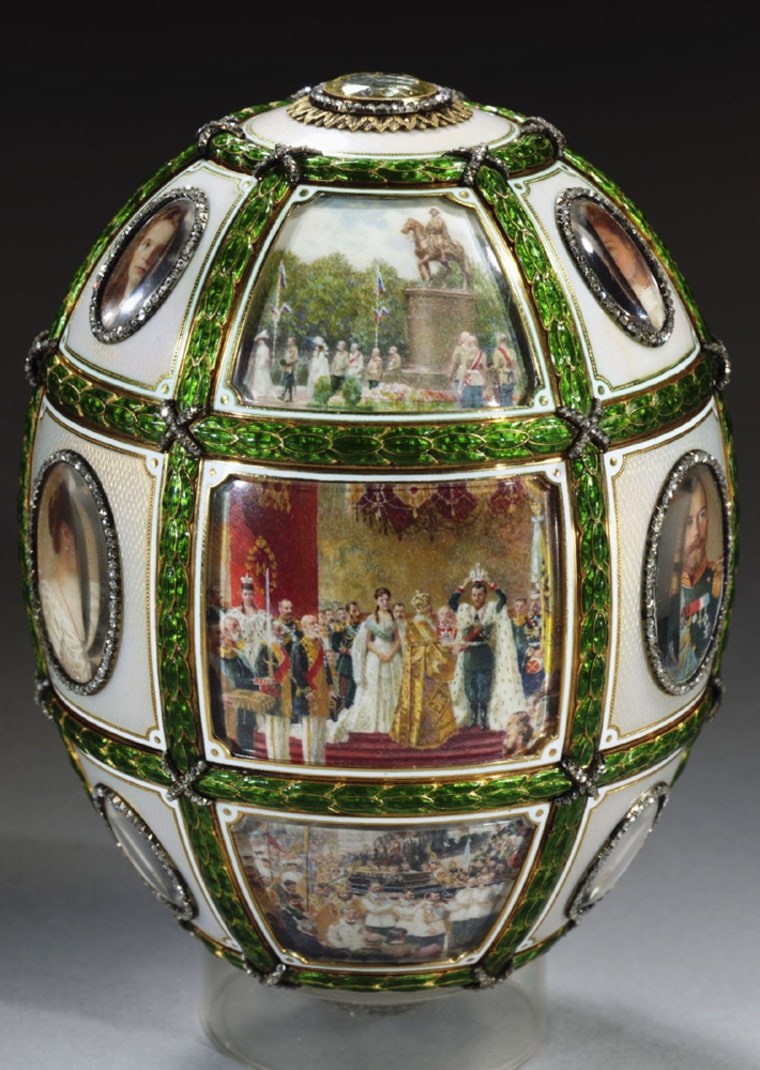For their return home, they had the entire first class cabin of a New York-to-Moscow flight. Each had its own deluxe carrying case, accompanied by a burley security guard. The giveaway, however, was the limousine: a four-ton armored truck.
Nine jewel-encrusted eggs by the legendary designer Carl Fabergé are back home in Russia for the first time in almost a century. They were put on display Tuesday at the Kremlin.
The works of Fabergé have become synonymous with the opulence of Russia's czars, who commissioned enameled eggs, meticulously decorated in gold, silver, platinum and gems, as traditional gifts on Russian Orthodox Easter.
The eggs are often referred to in the art world as priceless, one-of-a-kind objects. But these imperial objects do indeed have price. It was named by descendants of Malcolm Forbes, the billionaire American publisher, an avowed capitalist who spent much of his life in pursuit of Fabergé masterpieces, partly in an effort to best the collection of the then-communist leadership in the Kremlin.
Earlier this year, the Forbes family announced it would part with its stunning collection, housed in a family museum in New York.
Sothebys, the New York auction house, put a price tag of $18-24 million on the Coronation Egg, given by Russia's last czar, Nicholas II, to his wife, Alexandra, on Easter of his first year in power, in 1897. Forbes acquired it from another collector in 1979.
The Rosebud Egg, also a gift from Nicholas to Alexandra, is the least expensive, according to Sothebys. It would fetch a modest $4 million at an auction.
Russian to the rescue
But almost immediately after Sothebys announced the auction of the Forbes collection in January, Viktor Vekselberg, a Russian oil magnate, stepped in to purchase the entire lot at an undisclosed price, estimated to be around $100 million.
"This kind of situation happens maybe once in a hundred years," Vekselberg said in an interview. "It's a huge collection and very important to Russia."
A number of Russian museums are vying to add the eggs to their permanent collections, but so far Vekselberg hasn't made any promises. After a three-month exhibit in the Kremlin, the eggs will go on display in Yekaterinburg, where Nicholas II and his family were executed in 1917, and in St. Petersburg, the old imperial capital.
Vekselberg said he wanted to give Russians an "opportunity to touch time, to touch history," but that he didn't envision donating the collection to a government museum.
"So far, it's my collection, and I don't see in the near future some change in that situation," he said, though he is formulating plans to build a private museum, perhaps in Moscow.
'Sensational discoveries'
The reaction to the return of the eggs has been mixed.
Zelfira Tregulova, deputy director of museum exhibits at the Kremlin, says the ability to study the Forbes collection in its entirety will lead to "sensational discoveries."
"It's getting back our national heritage, our national memory, and incredible works of art which were not (available) for any kind of serious study for our specialists." She said the Kremlin expects "incredible public interest" during the exhibit.
The cash-strapped Kremlin museums so valued the collection, Tregulova said, that they appealed to the Russian government to approach the Forbes family to buy at least the Renaissance Egg, which still bears a Kremlin museum inventory number.
Like many eggs, the exact circumstances of its sale, under or over the table, are clouded by the chaos that followed Nicholas II's execution.
Cozying up to the Kremlin
Hardened observers of what goes on inside the Kremlin walls say there is more politics than philanthropy behind Vekselberg's sudden purchase. The 47-year-old Vekselberg, who Forbes magazine estimated recently was worth $5.9 billion, earned his fortune virtually overnight when the Soviet Union collapsed, parlaying business savvy and political contacts into an oil and metals fortune.
Vekselberg's purchase of a Russian national treasure came only weeks after President Vladimir Putin scolded a gathering of Russia's richest businessmen, known derisively as "oligarchs," for not giving back to their country.
Vekselberg denied that buying the eggs was a political move. "I did not buy them because Putin said something," he said.
Tregulova, the exhibit director, said she hoped the country was witnessing a new breed of Russian businessman — taking his cue from Forbes, a prominent philanthropist.
"If I were to be in the place of any of the serious Russian contemporary businessmen, and having such an opportunity, I would invest in (the eggs) rather than buying a new yacht or a football club," she said.
Across town in the offices of one of his holding companies, Russia's third richest man said times were changing.
"Three to five years ago, a (stereotypical) Russian businessman looked like a very aggressive guy ... on a huge yacht, surrounded by young girls. In general, we are different. But it's difficult to show this. The answer is time. We need time."
